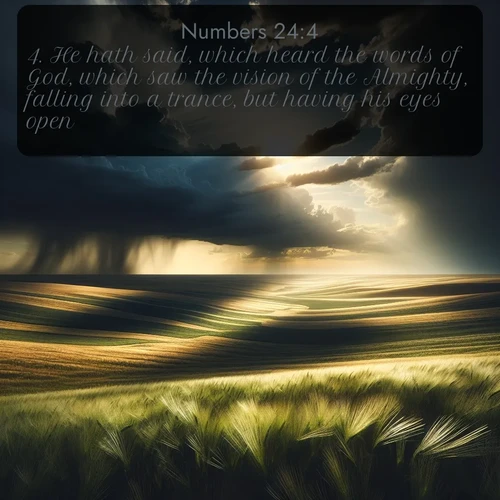Numbers 24:4 plusieurs versions / traductions
English Bible Translations
4. He hath said, which heard the words of God, which saw the vision of the Almighty, falling into a trance, but having his eyes open:
4. He saith, who heareth the words of God, Who seeth the vision of the Almighty, Falling down, and having his eyes open:
4. He says, whose ears are open to the words of God, who has seen the vision of the Ruler of all, falling down, but having his eyes open:
4. He saith, who heareth the words of ùGod, who seeth the vision of the Almighty, who falleth down, and who hath his eyes open:
4. He hath said, who heard the words of God, who saw the vision of the Almighty, falling into a trance, but having his eyes open:
4. An affirmation of him who is hearing sayings of God -- Who a vision of the Almighty seeth, Falling -- and eyes uncovered:
German Bible Translations
4. es sagt der Hörer göttlicher Rede, der des Allmächtigen Offenbarung sieht, dem die Augen geöffnet werden, wenn er niederkniet:
4. der des Allmächtigen Gesichte sieht, welcher niederfällt, und dem die Augen geöffnet werden:
French Bible Translations
4. déclaration de celui qui entend les paroles de Dieu, de celui qui discerne la vision du Tout-Puissant, de celui qui se prosterne et dont les yeux s'ouvrent.
4. Parole de celui qui entend les paroles de Dieu,De celui qui voit la vision du Tout-Puissant,De celui qui se prosterne et dont les yeux s’ouvrent.
4. Parole de celui qui entend les paroles de Dieu, De celui qui voit la vision du Tout-Puissant, De celui qui se prosterne et dont les yeux s'ouvrent.
4. Celui qui entend les paroles de Dieu, qui voit la vision du Tout-puissant, qui tombe et qui a les yeux ouverts, dit:
4. Celui qui entend les paroles du [Dieu] Fort; qui voit la vision du Tout-Puissant; qui tombe à terre, et qui a les yeux ouverts, dit :
4. Oracle de celui qui entend les paroles de Dieu, qui voit la vision du Tout-Puissant, qui se prosterne et dont les y eux sont ouverts:
Versions with Strong Codes
Numbers 24 / KJV_Strong4.
Strong Code definitions
H5002 n'um neh-oom' from H5001; an oracle:--(hath) said, saith. see H5001
H8085 shama` shaw-mah' a primitive root; to hear intelligently (often with implication of attention, obedience, etc.; causatively, to tell, etc.):--X attentively, call (gather) together, X carefully, X certainly, consent, consider, be content, declare, X diligently, discern, give ear, (cause to, let, make to) hear(-ken, tell), X indeed, listen, make (a) noise, (be)obedient, obey, perceive, (make a) proclaim(-ation), publish, regard, report, shew (forth), (make a) sound, X surely, tell, understand, whosoever (heareth), witness.
H561 'emer ay'-mer from H559; something said:--answer, X appointed unto him, saying, speech, word.see H559
H410 'el ale shortened from H352; strength; as adjective, mighty; especially the Almighty (but used also of any deity):--God (god), X goodly, X great, idol, might(-y one), power, strong. Compare names in "-el."see H352
H834 'aher ash-er' a primitive relative pronoun (of every gender and number); who, which, what, that; also (as an adverb and a conjunction) when, where, how, because, in order that, etc.:--X after, X alike, as (soon as), because, X every, for, + forasmuch, + from whence, + how(-soever), X if, (so) that ((thing) which, wherein), X though, + until, + whatsoever, when, where(+ -as, -in, -of, -on, -soever, -with), which, whilst, + whither(- soever), who(-m, -soever, -se). As it isindeclinable, it is often accompanied by the personal pronoun expletively, used to show the connection.
H2372 chazah khaw-zaw' a primitive root; to gaze at; mentally, to perceive, contemplate (with pleasure); specifically, to have a vision of:--behold, look, prophesy, provide, see.
H4236 machazeh makh-az-eh' from H2372; a vision:--vision. see H2372
H7706 Shadday shad-dah'-ee from H7703; the Almighty:--Almighty. see H7703
H5307 naphal naw-fal' a primitive root; to fall, in a great variety of applications (intransitive or causative, literal or figurative):--be accepted, cast (down, self, (lots), out), cease, die, divide (by lot), (let) fail, (cause to, let, make, ready to) fall (away, down, -en, -ing), fell(-ing), fugitive, have(inheritance), inferior, be judged (by mistake for H6419), lay (along), (cause to) lie down, light (down), be (X hast) lost, lying, overthrow, overwhelm, perish, present(-ed, -ing), (make to) rot, slay, smite out, X surely, throw down.see H6419
H5869 `ayin ah'-yin probably a primitive word; an eye (literally or figuratively); by analogy, a fountain (as the eye of the landscape):--affliction, outward appearance, + before, + think best, colour, conceit, + be content, countenance, + displease, eye((-brow), (-d), -sight), face, + favour, fountain, furrow (from the margin), X him, + humble, knowledge, look, (+ well), X me, open(-ly), + (not) please, presence, + regard, resemblance, sight, X thee, X them, + think, X us, well, X you(-rselves).
H1540 galah gaw-law' a primitive root; to denude (especially in a disgraceful sense); by implication, to exile (captives being usually stripped); figuratively, to reveal:--+ advertise, appear, bewray, bring, (carry, lead, go) captive (into captivity), depart, disclose, discover, exile, be gone, open, X plainly, publish, remove, reveal, X shamelessly, shew, X surely, tell, uncover.
Prédications qui analysent les thèmes Nombres 24
Thèmes : Prophéties de Balaam; La bénédiction de IsraelRelated Sermons discussing Numbers 24
Themes : Prophéties de Balaam; La bénédiction de Israelsee also: Bible Key Verses ; KJV Bible Images, BBE Bible images

